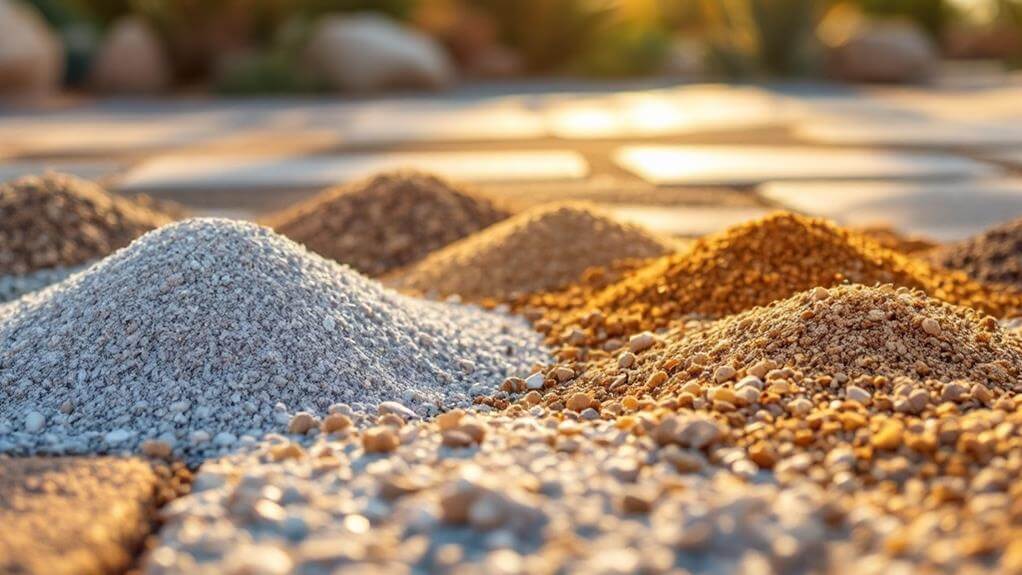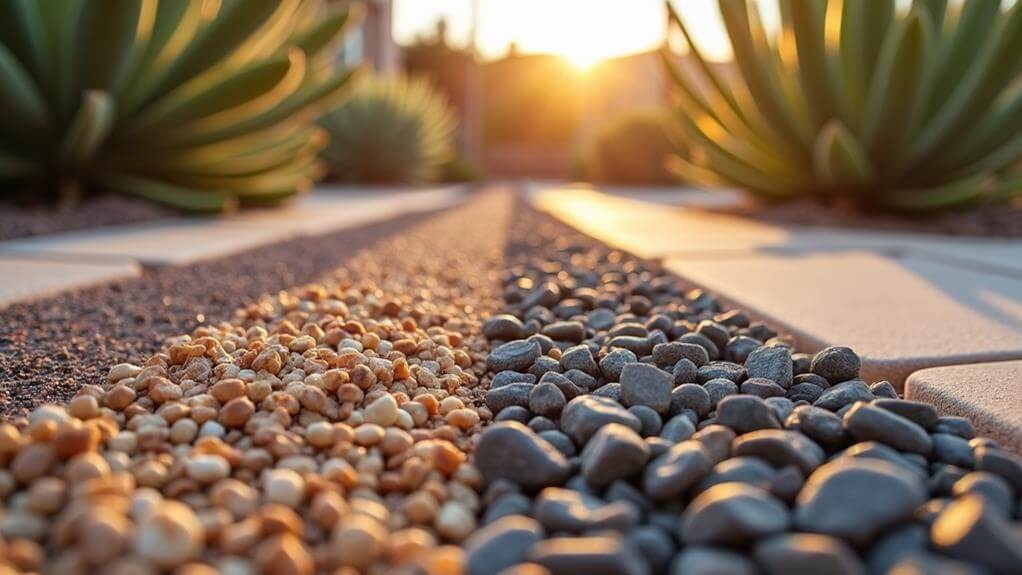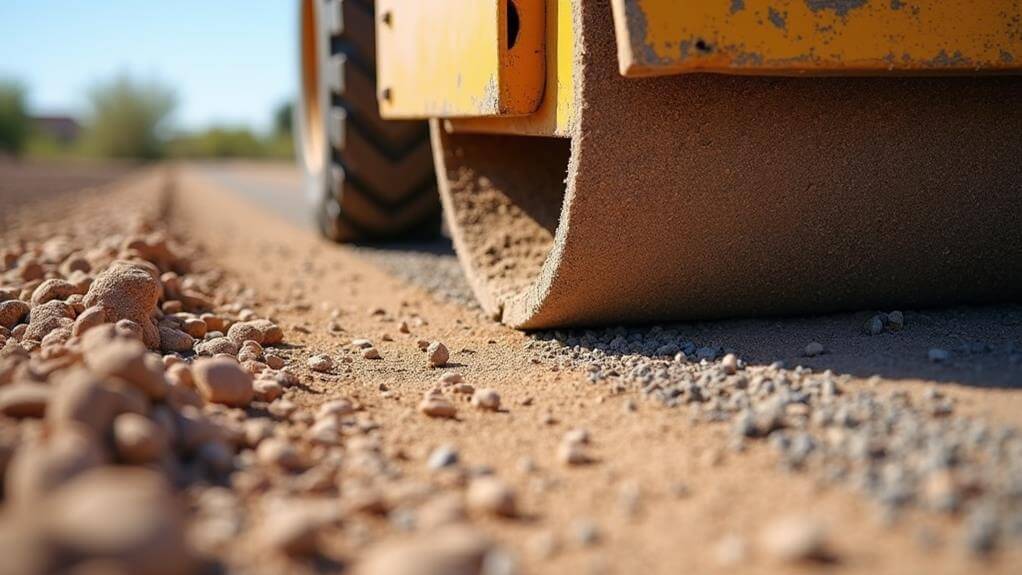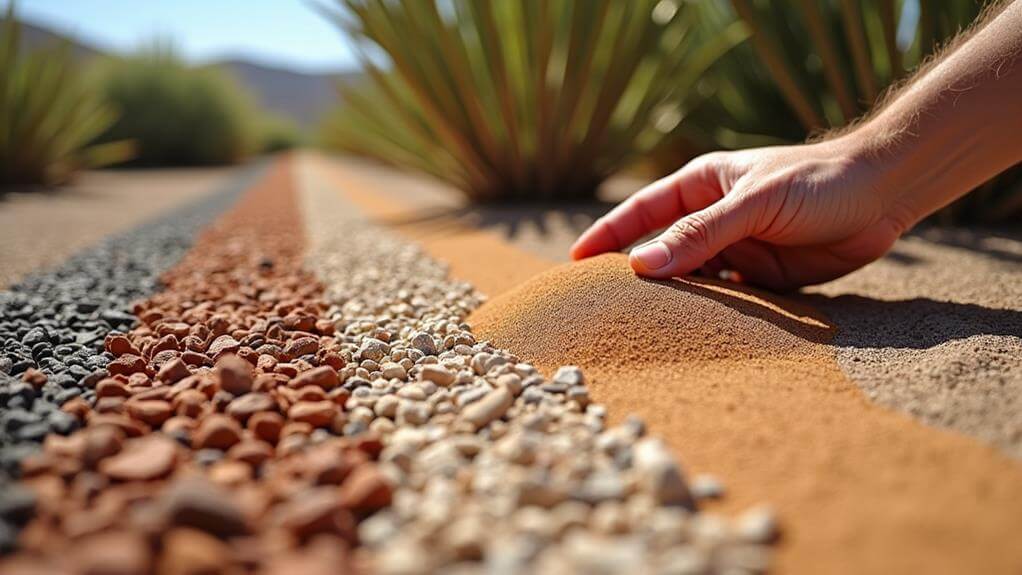
Choosing the right paver base material is like laying the foundation for a masterpiece in Chandler’s unique climate. You might think all paver base materials are created equal, but the reality is quite different. Factors such as stability, drainage, and longevity come into play, and it’s essential to understand what works best for your specific project. From crushed gravel to polymer sand, each option has its own merits and drawbacks. You’ll want to get this right to avoid costly mistakes and guarantee your paver installation in Chandler stands the test of time. So, what’s the secret to the perfect base?
Understanding Paver Base Essentials

To lay the groundwork for a successful paver installation, you need to grasp the essentials of a proper paver base. The cornerstone of your powerful outdoor transformation starts with the right paver base material. In Chandler, the ideal choice is 3/4-inch crushed gravel. This robust material not only provides exceptional stability but is also vital for effective water drainage—ensuring your pavers remain steadfast, regardless of weather conditions.
When installing pavers, a properly prepared foundation is non-negotiable. A minimum base depth of four inches is essential to prevent any shifting or settling over time. This depth offers a solid support system that can withstand the test of time and the weight of any formidable design you choose.
Compacting the crushed stone using a vibratory compactor is the secret to a flawless, air-pocket-free base.
Above this, a one-inch layer of clean concrete sand serves as the perfect paver bedding, allowing for precision and stability during installation.
Completing your project with polymer sand in the joints post-installation won’t only cement your pavers in place but also ward off weeds, ensuring your powerful vision remains unblemished for years to come.
Evaluating Base Material Options
When evaluating base material options for your paver project in Chandler, you’ll frequently encounter a variety of choices, each with its own benefits and drawbacks. The recommended paver base material here is typically 3/4 inch crushed roadbase gravel. This option not only offers stability and drainage but also provides you with a robust foundation that’s less likely to shift or settle.
However, achieving the ideal base depth of at least 4 inches is vital. This depth guarantees your pavers won’t budge over time, giving you the confidence of a long-lasting installation.
But don’t stop there. Compaction is your secret weapon. By employing vibratory compactors and adding moisture, you can transform your gravel base into a dense, cement-like layer that screams durability. It’s about gaining control over your project, making sure everything remains firmly in place.
To top it off, a 1-inch layer of clean concrete sand or coarse sand is necessary for leveling. This smooths the surface, readying it for the final paver placement.
Consulting local suppliers can further enhance your decision-making, as they might offer insights that tailor these materials to your specific needs.
Importance of Proper Compaction

You can’t overlook the importance of proper compaction when installing pavers, as it guarantees a stable foundation and prevents future settling.
By achieving at least 95% compaction, you minimize the risk of pavers sinking or shifting over time.
Using a vibratory compactor and carefully applying water helps create a solid, cement-like base that supports your paver installation for years to come.
Ensuring Foundation Stability
Foundation stability is the cornerstone of any successful paver installation, and proper compaction plays a pivotal role in achieving this. In Chandler, where climate conditions fluctuate, a well-compacted paver base guarantees your investment stands the test of time.
Achieving at least 95% compaction is essential to prevent shifting and movement. This process minimizes air pockets, guaranteeing a solid base layer that promotes effective water flow and supports the weight above.
When initiating compaction, keep these powerful strategies in mind:
- Vibratory compactors: They enhance the compaction process, creating a denser, more stable paver base.
- Layered compaction: Compact the base material in multiple layers, achieving uniformity and strength.
- Moisture incorporation: Add water during compaction to give your gravel a cement-like consistency.
- Thoroughness: Confirm each layer is compacted adequately, avoiding shortcuts that could compromise stability.
Preventing Future Settling
Preventing future settling is essential for maintaining a stable and durable paver installation. You want your paver project to stand the test of time, and achieving this starts with the right paver base and proper compaction. By focusing on at least 95% compaction, you minimize the risk of unsightly settling and guarantee your installation remains solid.
The secret weapon here is the vibratory compactor. This tool helps you eliminate air pockets, transforming your base into a cement-like foundation that won’t budge.
Execute compaction like a pro by repeating the process at each stage. Every time you add a layer of base material, grab that vibratory compactor and go to work. This guarantees even settling and creates a powerful, cohesive base.
Don’t forget the role of water—slightly dampening the base before compaction can help achieve the perfect density. But be cautious; too much water can turn the process into a muddy mess.
Aim for a minimum base depth of 4 inches, especially in Chandler’s heavy clay areas. This depth prevents shifting and keeps your pavers looking pristine.
Master these techniques, and your paver installation will be an indication of your expertise and foresight.
Drainage and Weather Considerations
When tackling the challenges of Chandler’s arid climate, choosing the right paver base material is essential for effective drainage and weather resilience. Opting for an open-graded crushed stone as your paver base enhances drainage capabilities, allowing water to flow through seamlessly. This choice minimizes the risk of erosion and standing water, ensuring your installation is equipped to handle Chandler’s unique weather conditions.
By selecting permeable pavers, you can further control runoff issues and maintain the stability of your surfaces.
Consider these powerful strategies to fortify your paver installation:
- Install French drains: Channel excess water away, ensuring your paved surface remains stable and long-lasting.
- Choose lighter-colored paver materials: Reflect sunlight to minimize heat absorption, maintaining a cooler surface during Chandler’s scorching summers.
- Ensure a minimum base depth of 4-6 inches: Provide adequate support while accommodating potential ground movement due to temperature fluctuations.
- Combine permeable pavers with a well-drained base layer: Substantially mitigate runoff issues, making them ideal for Chandler’s weather conditions.
Tips for Selecting the Best Base

Selecting the right paver base material in Chandler is key to creating a durable and resilient installation. You want a foundation that can withstand time, weather, and the unique soil conditions of Chandler.
Start by considering an open-graded crushed stone base. It’s highly recommended for its exceptional drainage capabilities, critical in preventing water accumulation and erosion. This choice guarantees your installation remains steadfast even in challenging conditions.
Don’t overlook the importance of compaction. Achieving at least 95% compaction is essential to prevent future settling and movement. This precision guarantees your pavers stay level and secure, giving you the power to create a lasting impression.
Aim for a minimum base depth of 4 inches, especially in areas with varying soil conditions, to provide a stable foundation for your project.
For those who favor traditional installations, a sand-set foundation offers excellent support and stability for interlocking pavers.
But remember, consulting multiple local suppliers about base materials is important. They can offer insights tailored to Chandler’s climate and soil conditions, guiding you towards the most effective choice for your project.
Make informed decisions and build with confidence.
Professional Installation Insights
For a flawless paver installation in Chandler, professional insights can make all the difference. By leveraging the expertise of seasoned contractors, you can guarantee your paver projects are both durable and visually striking.
The foundation of any successful installation lies in the paver base. Start with a minimum of 4 inches of crushed roadbase gravel. This compacted gravel provides the fundamental stability and support needed to prevent shifting and sinking over time.
Achieving at least 95% compaction with a vibratory compactor is essential. This step assures a solid base that withstands Chandler’s unique climate demands. On top of this, add a 1-inch layer of clean concrete sand. This setting bed is crucial for the proper alignment and level of the pavers, making sure your project looks pristine.
Consider the following professional tips:
- Compacted Gravel: Guarantees lasting stability and prevents future issues.
- Concrete Sand Layer: Provides a perfect setting bed for uniform paver placement.
- Weather-Resistant Materials: Key for Chandler’s climate.
- Licensed Contractors: Their expertise prevents costly mistakes and reinstallation.
Conclusion
Isn’t it interesting how the best paver base material in Chandler coincidentally aligns perfectly with the region’s demands? By choosing 3/4-inch crushed gravel or crushed roadbase gravel, you’re not just ensuring stability but also embracing the wisdom of local experts. With proper compaction, a layer of concrete sand, and polymer sand for joints, your pavers will stand strong against time and weather.
For professional assistance, consider Paradise Hardscapes – Pavers & Turf – Chandler. Located in Chandler, this company specializes in hardscaping services such as paver installation, turf installation, masonry, concrete, pool decks, and outdoor kitchens.
With 8 years in business and over 50 five-star Google reviews, Paradise Hardscapes is licensed, bonded, and insured, and they offer free estimates. Trust in their expertise, and you’ll create a lasting outdoor space that feels like home. Contact them at (480) 750-4345 for more information.
